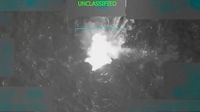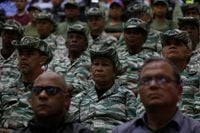On Friday, September 12, 2025, a tense maritime encounter unfolded in the Caribbean that has since rippled through diplomatic circles in Washington and Caracas. Personnel from the U.S. Navy destroyer USS Jason Dunham boarded a Venezuelan fishing vessel, searching for drugs based on a tip—but found nothing. The incident, which both sides have characterized in starkly different terms, is only the latest flashpoint in a region already simmering with suspicion and military posturing.
According to ABC News, U.S. Coast Guard personnel attached to the USS Jason Dunham carried out the search after receiving information that the Venezuelan boat might be carrying contraband. A U.S. official stated the operation was a routine part of ongoing counter-narcotics efforts and insisted that the fishing boat was in international waters at the time. The official also rejected claims that the search lasted eight hours, calling the Venezuelan timeline an exaggeration.
But the Venezuelan government painted a more dramatic picture. At a press conference on Saturday, September 13, Foreign Minister Yván Gil told journalists that eighteen armed U.S. personnel had “illegally and hostilely boarded” a Venezuelan tuna boat with nine fishermen on board while it was sailing in Venezuelan waters. “Those who give the order to carry out such provocations are seeking an incident that would justify a military escalation in the Caribbean,” Gil said, warning that Venezuela would defend its sovereignty against any “provocation.” He further alleged that the U.S. forces remained on the vessel for eight hours, preventing communication and normal activities, before the fishermen were released under escort by the Venezuelan navy. The fishing boat, Gil noted, had full authorization from Venezuela’s Ministry of Fisheries to operate.
To bolster its account, Venezuela’s foreign ministry released a short video, purportedly filmed by the fishermen, showing part of the fishing boat, U.S. Navy personnel, and the warship. “This operation lacks any strategic proportionality and constitutes a direct provocation through the illegal use of excessive military means,” the ministry said in a formal statement.
The White House, for its part, did not immediately respond to requests for comment. The incident, however, comes against a backdrop of escalating U.S. military activity in the region. In August, President Donald Trump ordered the deployment of additional warships to the Caribbean, citing a need to crack down on Latin American drug cartels. The Trump administration has accused Venezuelan President Nicolás Maduro of leading a cartel to flood the U.S. with drugs, doubling the reward for his capture from $25 million to $50 million. Maduro has repeatedly denied these accusations, calling them a pretext for U.S. intervention.
Earlier in September, the Pentagon reported that two Venezuelan military aircraft had flown near the USS Jason Dunham in international waters, a move U.S. officials described as “highly provocative” and intended to disrupt American operations. The tension has not been limited to surveillance or intimidation. On September 2, President Trump announced that the U.S. military had launched a strike on a suspected drug boat originating from South America, killing 11 alleged members of the Tren de Aragua gang. The president said the operation had “positively identified Tren de Aragua narcoterrorists.”
Yet the aftermath of that strike has raised new questions. According to The New York Times, U.S. officials reported the vessel was turning back toward Venezuela after its crew sensed they were being followed by aircraft. The officials also said that the military made repeated strikes on the boat even after it was disabled, suggesting the objective may have been to eliminate not just the narcotics but the couriers as well. Legal and military experts have since warned that the U.S. may have crossed a dangerous line, shifting from a law enforcement operation to what some describe as “bloodlust.” Critics argue that unless criminal suspects are actively firing back, international law prohibits the use of deadly military force in such instances. “Unless criminal suspects are firing back at you, globally recognized rules say that using deadly military force in instances like that is, well, criminal,” wrote Tim Padgett, Americas Editor for WLRN, in the Sun Sentinel.
Venezuelan officials have accused the United States of committing extrajudicial killings and denied any involvement of the deceased in drug trafficking. Interior Minister Diosdado Cabello called Washington’s version “a tremendous lie,” suggesting the incident could be linked to the disappearance of individuals in a coastal region who had no ties to narcotics. Venezuela has responded by calling on its citizens to join militias and attend military training sessions, urging preparedness in the event of a potential U.S. incursion. The government’s rhetoric is matched by a steady drumbeat of official statements and visual evidence—photos, videos, and press conferences—meant to rally public sentiment and project resolve.
Meanwhile, the U.S. maintains that its actions are part of a broader campaign against narcoterrorism. The Trump administration has deployed at least seven warships and a submarine to the southern Caribbean, according to History Illustrated, a move critics say is as much about projecting power as it is about stopping drugs. The U.S. has also labeled gangs like Tren de Aragua as terrorist organizations, a designation that raises the stakes for any future confrontations. On September 4, just one day after the deadly strike, the U.S. Secretary of State was in Ecuador designating two more drug gangs as terrorists. Such moves, analysts warn, risk blurring the line between law enforcement and military action, making it easier to justify lethal force against suspected traffickers.
The broader context is crucial. As History Illustrated explains, Venezuela’s own role in global cocaine production is minimal—it is considered a transit hub rather than a major producer. The U.S. war on drugs, which began under President Richard Nixon in 1971 and escalated under Ronald Reagan, has long been criticized for its political uses and unintended consequences. Abroad, the war has enabled Washington to pressure or intervene in countries across Latin America. At home, it has contributed to mass incarceration and racial disparities.
Today, the war on drugs seems to have no end in sight. Crackdowns abroad often fragment cartels, leading to more local violence, while increased security forces sometimes abuse human rights. Disruptions to cocaine production have led to a rise in the trafficking of fentanyl and methamphetamine. With each new escalation—whether it’s a maritime boarding or a deadly missile strike—the risk of a broader conflict grows.
As both sides dig in, the fate of nine Venezuelan fishermen and one boarded boat has become a symbol of a much larger struggle: one that pits sovereignty against security, and the rule of law against the logic of war. The world is watching to see which principle will prevail.



